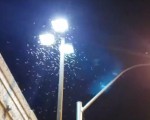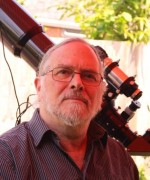Dark Skies, Dark Habitats: the Key to Biodiversity
Steve Tonkin SpeakerNet Sponsor
- Regions:
- Hampshire, Isle of Wight, West Sussex, Berkshire, Dorset, Wiltshire, Somerset
- Notice Period:
- Emergency (maybe less than one week's notice)
- Type:
- Astronomy and Cosmology
- Fee:
- Expensed: Free, but travel expenses (+ overnight accommodation for long distances) will be required
- Category:
- Science
- Updated:
- 17th November 2025
- Tagged:
- Environment | Ecology | Biodiversity | Light Pollution
Nature Needs the Night
Light Pollution was first identified as a problem by astronomers, but its consequences reach far wider. It is now widely recognised that artificial light at night, especially bright white light, can have profoundly negative effects on human health, and this is just the tip of an iceberg of harm. The effects on wildlife have been devastating, leading directly to the death of millions of birds each year and being the major driver of the insect apocalypse (studies suggest that 40% of insects will be extinct within the next few decades).
The solutions are at hand, are simple to implement, will have a net saving (of money, energy use and carbon emissions) and will not compromise security or our ability to safely work, travel and play at night. We need to act now before it is too late.
Views: 1679 | Enquiries: 7About Steve Tonkin
I am a Fellow of the Royal Astronomical Society and have authored many articles and several books on practical aspects of astronomy. I taught astronomy to adults and children for more than 40 years. I am the Dark Skies Advisor to both the Federation of Astronomical Societies and the International Dark Sky Reserve on the Cranborne Chase National Landscape, and split my time between these and doing astronomical outreach. As well as astronomical societies in Britain and abroad, I frequently speak to Rotary and Probus clubs, U3A groups, and schools/youth organisations. I have a monthly column in BBC Sky at Night Magazine, for which I also write equipment and book reviews.
I can deliver talks remotely over Zoom, Webex or MS Teams.
If you would like to see if I am available on the date you want, you can view my Bookings Calendar at https://astunit.com/talks.php
Fee (but not travel expenses from Fordingbridge, Hampshire) may be waived or reduced for charitable organisations supporting children or the environment, cubs/scouts/guides, etc. Ask for details.
Other Talks on SpeakerNet by Steve Tonkin
Send a message to the speaker
If you are interested in this talk and wish to contact the speaker, please complete the following form:


